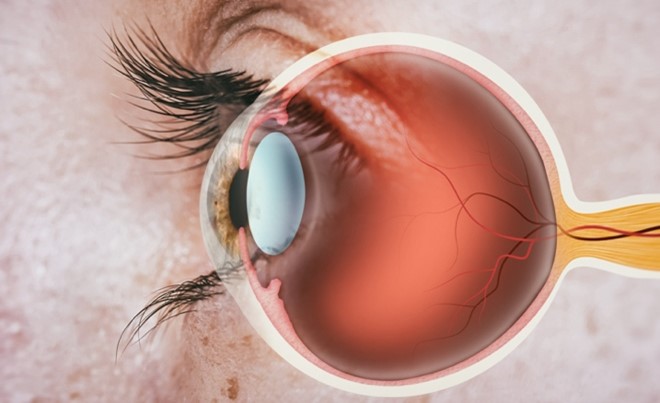
Savera Hospital
Amritsar Road, Opp. Dera Beas Moga
Phone Number
+(91) 9855827744
Send Your Mail
santnetralaya@gmail.com
CENTRAL SEROUS CHORIORETINOPATHY
Q.What is central serous chorioretinopathy ?
Central serous retinopathy is a medical condition that occurs when fluid builds up behind the retina in your eye. The fluid can cause your retina to detach, leading to vision problems or vision loss.
Your retina is a layer of tissue behind each eye. It senses light and translates it into images your brain can understand.
The condition is also called central serous chorioretinopathy.
Q.What are the symptoms of central serous chorioretinopathy ?
Central serous retinopathy can affect one eye or both at the same time. Symptoms might include:
- Blurry vision, like a smudge in the center of your sight.
- Dark spot in the center of your vision.
- Darker or dim vision.
- White items look dull or somewhat brown.
- Objects seem smaller or further away than they are.
- Straight lines look crooked or bent.
However, central serous chorioretinopathy doesn’t always cause symptoms. A person can have the condition but not have vision problems
Q.What are the risk factors for central serous chorioretinopathy ?
Men in their 30s to 50s are more likely to develop central serous chorioretinopathy than women. Stress is a major risk factor. People under a lot of stress may be more likely to develop central serous chorioretinopathy.
Other risk factors for central serous chorioretinopathy are:
- Use of corticosteroids (by mouth, topical, inhaled or injected)
- Use of phosphodiesterase-5 inhibitor medications
- Autoimmune disease (when the body attacks its own tissues)
- Obstructive sleep apnea (OSA)
- “Type A” personality traits or being overly anxious and stressed out
- Pregnancy
- Cushing syndrome (an endocrine disorder with elevated cortisol or stress hormone levels)
- Hypertension (high blood pressure)
- Organ transplantation
Q.How is central serous chorioretinopathy diagnosed ?
Your doctor will conduct a complete dilated eye examination in both eyes, and will obtain imaging of the retina.
Retinal photographs may be taken to document the appearance of disease.
Optical coherence tomography (OCT) is a retinal scan that is very helpful in diagnosing CSC; it enables your doctor to see the retina at the microscopic level. This makes it possible to identify very small pockets of fluid or retinal scarring (once the fluid has subsided) in acute or chronic CSC .
Fluorescein angiography is a test in which a dye is injected into a patient’s arm vein and pictures are taken of each eye to detect characteristic leakage of the dye beneath the patient’s retina. This test, along with OCT, allows your doctor to make the diagnosis of CSC and to distinguish it from other retinal diseases causing fluid in the macula.
How is central serous chorioretinopathy treated ?
Many cases of central serous retinopathy go away on their own over a few weeks or months. So your healthcare provider may recommend monitoring, or “watch and wait.” During the monitoring period, they’ll repeat tests to ensure the fluid is draining.
Your healthcare provider also may ask you to stop taking medications that contribute to the eye condition. They’ll also counsel you to reduce stress.
If the fluid doesn’t drain on its own in a few months, your healthcare provider may recommend central serous retinopathy treatment:
- Medications: Some medications may help treat central serous retinopathy. For example, topical Non steroidal anti-inflammatory agents, Oral Mineral-corticoid receptor Antogonist.
- Laser treatments: Thermal laser treatment uses a heated laser to seal leaks. Micropulse laser uses smaller, shorter laser pulses.
How can I reduce my risk of central serous retinopathy?
It may not be possible to prevent central serous retinopathy. But you can reduce your risk by managing stress and limiting the use of corticosteroids.
What can I expect if I have central serous retinopathy?
Many cases of central serous retinopathy go away on their own as fluid naturally drains. But treatment may be necessary if the condition continues for several months.
After the condition resolves, vision generally improves on its own, often returning to normal. But sometimes damage can be permanent, with vision changes that don’t improve.
The condition can happen again, even after successful treatment, in the same eye or your other eye. For this reason, you may need regular follow-up appointments with an ophthalmologist.
Other Services

Comprehensive Exams

Dry Eyes Services

Advanced Ocular Care
Why Patients Choose Savera Eye Hospital
Patients choose Savera Eye Hospital for a variety of reasons, each reflecting our commitment to excellence in eye care and patient satisfaction. Here are some of the key factors that set us apart and make us the preferred choice for individuals seeking trusted eye care services.
01
Medical Experience
Savera Eye Hospital boasts a team of highly skilled and experienced ophthalmologists, optometrists, and support staff dedicated to delivering exceptional eye care. Our specialists have undergone rigorous training and possess extensive expertise in their respective fields, ensuring that our patients receive the highest standard of care.
02
Art Technology
We invest in cutting-edge technology and advanced equipment to provide precise diagnoses and effective treatments for a wide range of eye conditions. From diagnostic imaging tools to surgical instruments, our state-of-the-art facility is equipped with the latest advancements in eye care technology.
03
Comprehensive Services
Savera Eye Hospital offers a comprehensive range of eye care services, including routine eye exams, cataract surgery, refractive surgery, glaucoma management, retinal services, pediatric eye care, and more. Whether you need preventive care or specialized treatment, we have the expertise and resources to meet your needs.
04
03
Personalized Care
We understand that each patient is unique, and we take a personalized approach to care. From the moment you walk through our doors, our dedicated team takes the time to listen to your concerns, answer your questions, and develop a customized treatment plan tailored to your specific needs and goals.
04
04
Commitment to Quality and Safety
We adhere to the highest standards of quality and safety in everything we do. From maintaining strict infection control protocols to following evidence-based practices, we prioritize patient safety at every step of the way. Our commitment to quality is reflected in our consistently excellent outcomes and high patient satisfaction rates.

Savera Hospital was established in 2010 by Dr. Rajiv Kumar Gupta with the aim to provide high-quality, accessible and affordable eye care for all.
Make Appointment
- Monday - Saturday 09 AM - 04 PM
- SUNDAY 10 AM - 01 PM
Powered by Savera Eye Hospital- Moga (Punjab)
Copyright © 2024. All rights reserved.
